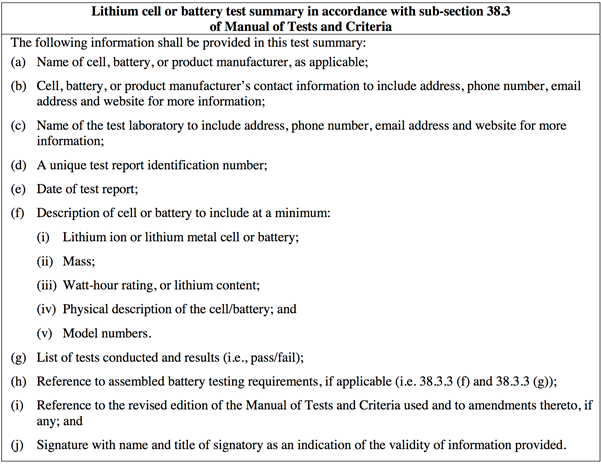Previously, the transport of lithium cells and batteries as such, in equipment and packed with equipment (UN Nos. 3090, 3091, 3480, 3481) was permitted only if a test of the lithium cells or batteries had previously been performed and passed in accordance with the criteria in Subsection 38.3 of the Recommendations for the Transport of Dangerous Goods – Manual of Tests and Criteria. However, so far, a mere confirmation of the performance and result of the test was sufficient. This could, for example, be contained in a safety data sheet in accordance with Article 31 of Regulation (EC) No 1907/2006 (REACH) or could be done informally. However, as this low-threshold requirement is often abused and successful testing has often been confirmed without ever having taken place, the relevant regulations will be tightened as of 1 January 2020 by the expiry of the relevant transitional period laid down in 1.6.1.47 ADR.
According to 2.2.9.1.7 g) ADR 2020 (with equivalents in 2.2.9.1.7 g) ADN, 2.2.9.1.7 g) RID and 2.9.4.7 IMDG Code), “Manufacturers and distributors of cells or batteries manufactured after 30 June 2003 shall provide the test summary specified in the Manual of Tests and Criteria, Part III, Subsection 38.3, Paragraph 38.3.5.”
The background to the inclusion of the “distributor” in the subsection 2.2.9.1.7 ADR is that the industry demanded the possibility for distributors to prepare test reports themselves in order not to have to disclose supply chains by having to pass on test reports in which the battery manufacturers are named. However, this is a choice in such a way that a distributor can either pass on the manufacturer’s test reports or self-prepared test reports.
The obligation to provide the test summary applies to lithium cells and batteries of all types and sizes, also to those covered by special provision 188 ADR, since point c) of special provision 188 ADR refers to 2.2.9.1.7 g) ADR. There is no de-minimis limit below which the test summary need not be made available.
Section 38.3.5 sets out the following requirements for the test summary:

Since it is not regulated in which form the test report must be made available, several variants can be considered. These range from making the test report available in online tools (by mentioning the relevant link on the transport documents) to simply adding it to the transport documents. According to our information, however, there is no obligation to pro-actively provide the test summary (as we know it for example for safety data sheets according to Article 31 of Regulation (EC) No. 1907/2006 (REACH)). Rather, anyone who has a legitimate interest in receiving the test summary should be able to request it from the manufacturer/distributor. However, it should nevertheless be noted that the test summaries must be made available on request and that the manufacturer/distributor arranging the transport is therefore obliged to at least keep the test summaries available. This may also be the subject of corresponding on-site inspections. Finally, there is no obligation for transport companies to carry the test summaries with them during carriage due to the lack of indications in the new wording of the ADR.
Do you have any questions about this news, or would you like to discuss the news with the author? Please contact: Michael Öttinger






